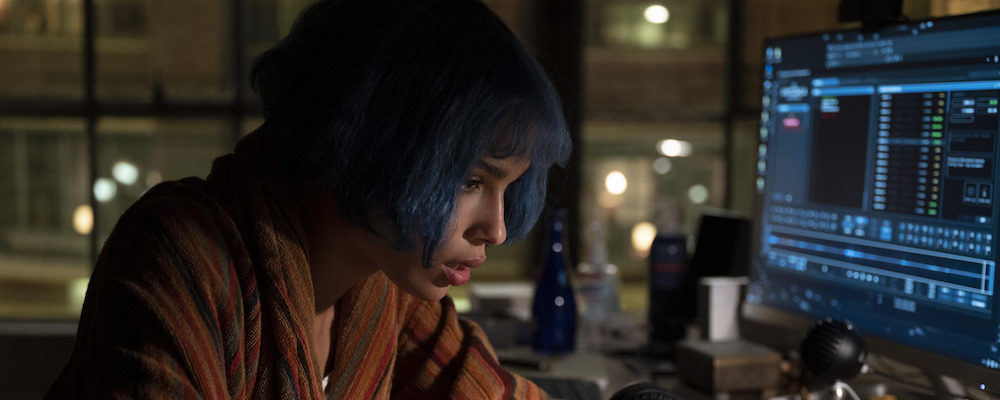‘Kimi’: Steven Soderbergh Fashions a Paranoid Thriller for Pandemic Times
Alci Rengifo
Steven Soderbergh is a modern master of simplicity when it comes to marshaling resources to make a movie. He just needs a few locations, a functioning digital camera and an excellent cast. This is why he continues to release a good amount of films, with a welcome energy in their storytelling. “Kimi,” Soderbergh’s new HBO Max film, brings together familiar paranoid tech thriller elements, for an entertaining movie where the true, buried theme is how genres will address a pandemic world. There’s also the wicked manipulation of how we now live in a world where machines truly do record every waking moment.
Decorated in the dyed hairdo that has defined cyberpunks or tech rebels for decades, Zoë Kravitz is perfectly cast as Angela Childs. She’s agoraphobic and was doing better until Covid forced everyone indoors. Now with the world slightly opening up again, Angela remains locked inside her Seattle apartment. She can do this because her job is working as a voice stream interpreter for a company that makes an Alexa-like digital assistant called Kimi. Angela’s social life is beyond sparse, with most interactions with her mother (Robin Givens) taking place via FaceTime. Sometimes she hooks up with a friend (Byron Bowers), who would obviously like the relationship to mean more. Through the endless streams of voices and lives Angela hears while checking Kimi recordings, she hears something perturbing. It sounds like a woman being attacked, possibly raped. When she attempts to alert her superiors, Angela’s boss not only dismisses her claims, but warns her not to bother him with this kind of material. Despite her fear of going past her front door, Angela decides to dig deeper into the recording and edges close to a plot that could easily endanger her very life.
For most of its running time “Kimi” engages as another one of the small-budget exercises Soderbergh has pinned down to a science. The rather tight screenplay is by David Koepp, who has written much grander rides like “Mission: Impossible” and “Jurassic Park.” For this project he seems inspired by Brian De Palma’s great “Blow Out,” where John Travolta plays a movie sound editor who is convinced he has recorded a murder linked to a political conspiracy. In “Kimi” it’s not so much the grand scheme that matters but the character of Angela. Zoë Kravitz becomes a powder keg of restrained anxieties. There has been much talk about how pandemic lockdowns affected those desperate to go back out into the world, yet Angela wouldn’t mind if the mandates had been endlessly extended. There are hints that she was once attacked and this provoked her agoraphobia. Luckily her tech job lets her stay at home, so her routine consists of sitting in front of the computer, blocking out the world with her noise canceling headphones. Once in a while she reaches out for the hand sanitizer dispenser near the keyboard. Her mother is a non-presence and her only “friend” seems to be a hacker with an Eastern European accent who gets annoyed that she won’t flirt back over the FaceTime calls that are their only communication.
Looking back at Soderbergh’s body of work, it’s impressive how he has dabbled in nearly every conceivable film form. He’s made political epics like “Traffic” and “Che,” popcorn delights like “Ocean’s Eleven,” and unnerving thrillers including “Contagion” (which gained a new relevance in light of Covid). Even in his smaller films, Soderbergh keeps his finger on the pulse of the times. The male stripper drama “Magic Mike” was a commentary on America amid the Great Recession, for example. “Kimi” doesn’t overstate its theme, but it’s basically an old-fashioned mini-thriller that taps into our growing dependence on devices and the psychological aftershocks of the world having come to a halt in the early stages of the ongoing pandemic. When Angela searches through Kimi recordings we hear various moments from customers’ domestic lives, and when she seeks help to crack the private information of the device that recorded the possible attack, Soderbergh makes it seem more than plausible. Kimi’s soothing electronic voice ready to receive any command takes on an eerie, darkly comic air. You may take a second look at your Alexa or Siri after the end credits. Few moments capture the anxiety of the times as when Angela realizes she needs to leave her apartment to take the evidence she has gathered to her corporate office. Kravitz develops a hunched, brisk walk as she races down Seattle streets, passing through protesters demanding an end to city plans for sweeping away homeless camps, another common sight in glossy corners of American industry.
Soderbergh gets so playful with the plot that the execution begins to matter more than the payoff. He has fun almost satirizing typical thriller elements, like goons sent to chase Angela, or corporate villain (Derek DelGaudio), who is involved in shady dealings with the company that makes Kimi. Yet the last 15 minutes of the movie feel like Soderbergh rushing to wrap up the plot in a way that’s quick and simple, instead of focusing more on the intricacies of hacking files or manipulating sound recordings. The chases through hallways and streets have the tone of iPhone shots, without much fanfare. It is the anxiety and paranoia that Kravitz evokes that creates much more suspense than the assassins sent to her apartment. Angela may be a heroine in a thriller, but when she looks out her window, and the prospect of simply walking to the taco truck turns into a nerve-shredding proposition, she becomes a character that fully embodies much of what the world has been feeling for the last two years.
“Kimi” begins streaming Feb. 10 on HBO Max.

